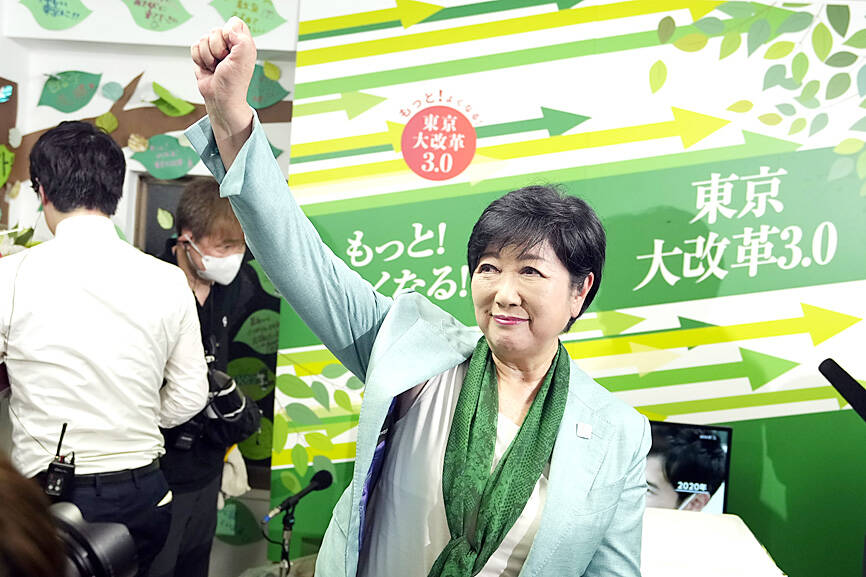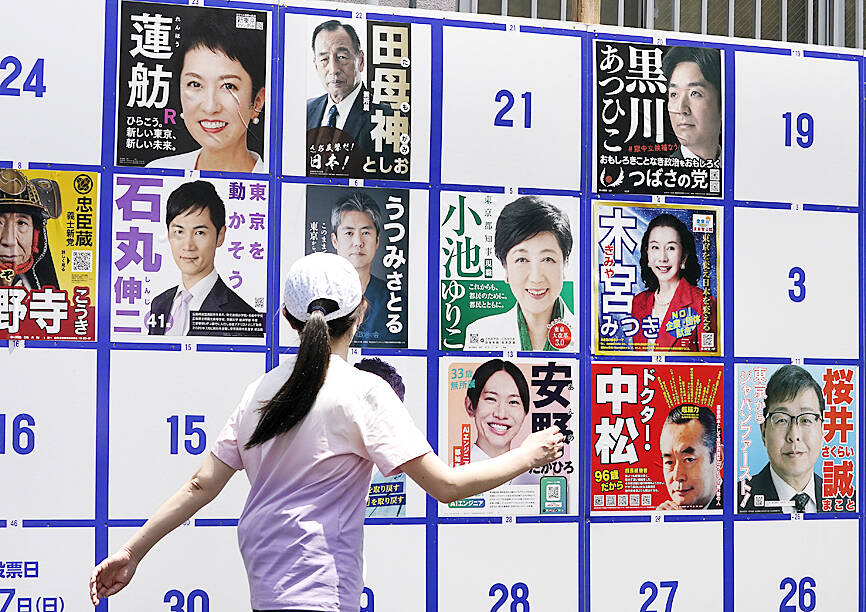Tokyo Governor Yuriko Koike was yesterday projected to win re-election as head of Japan’s influential capital for a third four-year term, according to exit poll results by Japan Broadcasting Corp (NHK).
Yesterday’s vote was also seen as a test for Japanese Prime Minister Fumio Kishida’s governing Liberal Democratic Party (LDP), which supports the first woman to lead the Tokyo city government.
The city of 13.5 million people with outsized political and cultural power, and a budget equaling some nations, is one of Japan’s most influential political posts.

Photo: AP
A record 55 candidates challenged Koike, and one of the top contenders was also a woman — a liberal-leaning former lawmaker who uses only her first name, Renho, and was backed by opposition parties.
Renho was born to a Japanese mother and Taiwanese father.
Minutes after the NHK exit poll projecting her victory, Koike arrived at her campaign headquarters in Tokyo and celebrated by thanking the voters who chose her.

Photo: EPA-EFE
“I believe the voters gave me a mandate for my accomplishment in the past eight years,” Koike said, pledging to push for more reforms and support for Tokyo residents.
“I’m fully aware of my heavy responsibility,” she said. “I will tackle my third term with all my body and soul.”
A win by Koike would be a relief for the LDP, which she has long been affiliated with. The party and its junior coalition partner, Komeito, unofficially backed her campaign.
Renho, running as an independent, but supported by the main opposition Constitutional Democratic Party of Japan and the Japanese Communist Party, criticized Koike’s connection with the LDP, which has been hit by a widespread slush fund scandal.
A victory for Renho would have been a major setback for Kishida’s chances in the party’s leadership vote in September.
While the two high-profile women gathered national attention, Shinji Ishimaru, a former mayor of Akitakata in Hiroshima Prefecture, was seen to have gained popularity among young voters.
The main issues in the campaign included measures for the economy, disaster resilience for Tokyo and low birth numbers.
Koike’s policies focused on providing subsidies for married parents expecting babies and those raising children.
Renho called for increased support for young people to address their concerns about jobs and financial stability, saying that would help improve prospects for marrying and having families.

TRAGEDY STRIKES TAIPEI: The suspect died after falling off a building after he threw smoke grenades into Taipei Main Station and went on a killing spree in Zhongshan A 27-year-old suspect allegedly threw smoke grenades in Taipei Main Station and then proceeded to Zhongshan MRT Station in a random killing spree that resulted in the death of the suspect and two other civilians, and seven injured, including one in critical condition, as of press time last night. The suspect, identified as a man surnamed Chang Wen (張文), allegedly began the attack at Taipei Main Station, the Taipei Fire Department said, adding that it received a report at 5:24pm that smoke grenades had been thrown in the station. One man in his 50s was rushed to hospital after a cardiac arrest

SAFETY FIRST: Double the number of police were deployed at the Taipei Marathon, while other cities released plans to bolster public event safety Authorities across Taiwan have stepped up security measures ahead of Christmas and New Year events, following a knife and smoke bomb attack in Taipei on Friday that left four people dead and 11 injured. In a bid to prevent potential copycat incidents, police deployments have been expanded for large gatherings, transport hubs, and other crowded public spaces, according to official statements from police and city authorities. Taipei Mayor Chiang Wan-an (蔣萬安) said the city has “comprehensively raised security readiness” in crowded areas, increased police deployments with armed officers, and intensified patrols during weekends and nighttime hours. For large-scale events, security checkpoints and explosives

A car bomb killed a senior Russian general in southern Moscow yesterday morning, the latest high-profile army figure to be blown up in a blast that came just hours after Russian and Ukrainian delegates held separate talks in Miami on a plan to end the war. Kyiv has not commented on the incident, but Russian investigators said they were probing whether the blast was “linked” to “Ukrainian special forces.” The attack was similar to other assassinations of generals and pro-war figures that have either been claimed, or are widely believed to have been orchestrated, by Ukraine. Russian Lieutenant General Fanil Sarvarov, 56, head

PUBLIC SAFETY: The premier said that security would be tightened in transport hubs, while President Lai commended the public for their bravery The government is to deploy more police, including rapid response units, in crowded public areas to ensure a swift response to any threats, President William Lai (賴清德) said yesterday after a knife attack killed three people and injured 11 in Taipei the previous day. Lai made the remarks following a briefing by the National Police Agency on the progress of the investigation, saying that the attack underscored the importance of cooperation in public security between the central and local governments. The attack unfolded in the early evening on Friday around Taipei Main Station’s M7 exit and later near the Taipei MRT’s Zhongshan